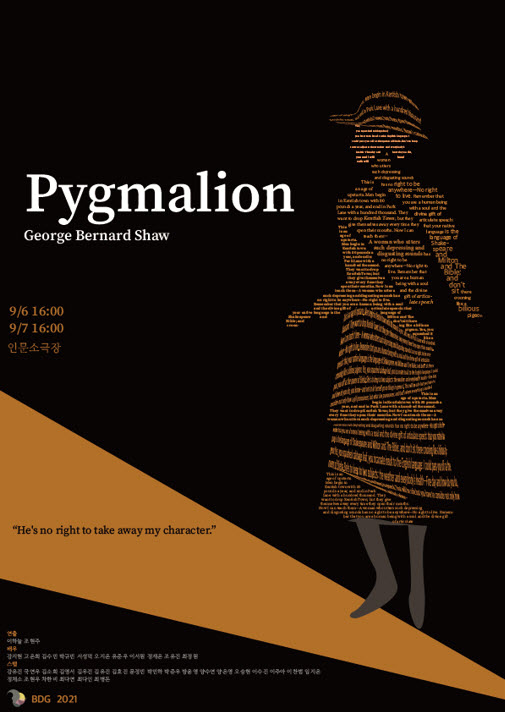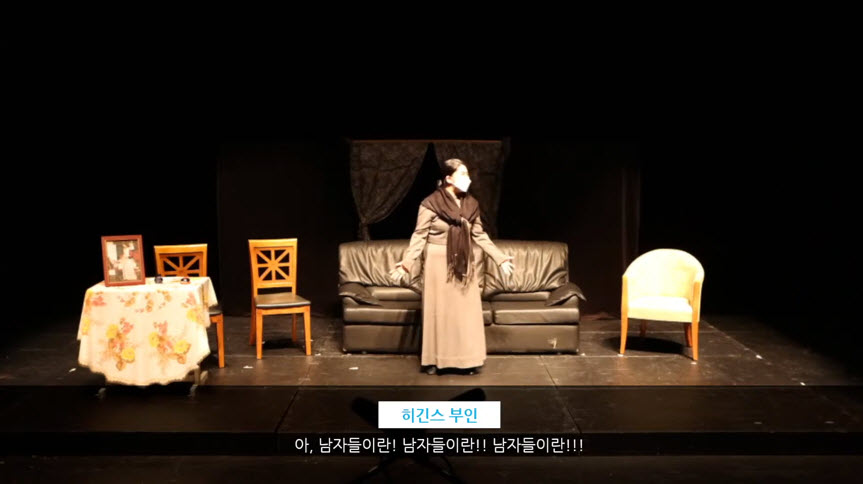COVID-19 has had drastic impacts on all areas of student activities, but perhaps the performing arts took it the hardest. Critical restrictions have hindered and changed the entire process of preparing for and staging live performances. Some clubs and programs have even been forced to go on hiatus, as was the case of BDG (Banished Dreamers Group) last year. They were able to make an online comeback this September with their 25th anniversary performance of George Bernard Shaw’s Pygmalion.

The Pygmalion performance poster
The College of Humanities’ Drama Union consists of seven clubs, each of which stages a classic play each year in its corresponding language. BDG is its English unit, affiliated with the Department of English Language and Literature. Ever since its debut in 1994, BDG has staged various works ranging from Shakespeare to modern dramas.
Audiences may be familiar with Pygmalion, this year’s work of choice, from the 1964 movie adaptation My Fair Lady, starring Audrey Hepburn. It is a reinterpretation of the Greek mythological figure in the context of early 20th century England. A character from Ovid’s Metamorphoses, Pygmalion embodies his image of the ideal woman into a sculpture named Galatea and falls in love with it. Eventually, Goddess Aphrodite grants him the opportunity for true love when Galatea comes to life.
In Bernard Shaw’s reimagination, Professor Henry Higgins is himself the unromantic loner, and the play follows his “transforming” a Cockney flower seller, Eliza, into an immaculate lady of high society. A tactful insight into the hierarchical society of the times, the play challenges the audience with several thoughtful questions about how people are judged. “These questions are still meaningful today, because we still rely on the elements mentioned in the play to judge others,” commented Haneul Lee (College of Liberal Studies), director of this year’s production. “For example, we might perceive people differently based on their accents – how Korean, English, or American their accent is – and we treat it like a very personal problem to fix.”

The online Pygmalion performance (from youtube channel the SNU Colllege of Humanities' Drama Union)
Staging a Play during the Pandemic
Preparations for the performance began this summer, and were initially held mostly online. After recruitment, actors each prepared monologues of choice and in mid-July performed them. Rehearsals for the main play began in full swing towards the end of the month. Due to the social distancing restrictions then, actors were put into groups of four, including one director and three actors. Lee spoke of the difficulties inherent in this new mode of practice. “Thankfully, we had two directors to work with, which was a relief. But because we could only meet with three actors at a time, the number of scenes we could rehearse was insufficient. Our only choice was to extend practice hours, sometimes even squeezing in early morning slots. I’m really grateful to the actors who participated in these schedules so enthusiastically.”
BDG however, devised ways to overcome these obstacles in its own way. Special workshops were held online to further the understanding of the play and its characters among the cast and crew. Professor Eun-ha Na, head of the drama club, was especially proud of these efforts. “At the beginning of the summer, we invited a drama professor from Illinois State University who specializes in dramaturgy and translation. We held a workshop called ‘Translations for Stage Plays’ where twenty-something students worked on comparing Korean and English dramas for three weeks.” The student in charge of subtitles also participated in this workshop, and during the actual performance many complimented how natural the translation was.
On the big day, September 6th and the following day as well, actors donned their costumes and disguises, topped with a KF-94 mask, and stepped on the stage of the Theatrum Humanitis, a small theater on campus. The play was streamed live via YouTube, and can still be watched, along with performances by other clubs, on the official channel of the SNU Drama Union. Although the actual seats of the theater were empty, the actors were met with active participation from the audience through the live chat section of the video. “It was a true ‘product of the times’,” laughed Jieun Oh (Department of English Language and Literature) who played the part of Mrs. Eynsford Hill. “And I think that’s exactly what art should be. It’s great that, through this year’s online performance, we were able to capture a little bit of how we’ve been able to persevere through the pandemic.”
As the brilliant crew of BDG have demonstrated, the show must, and will, go on.
Written by Minjoo Lee, SNU English Editor, mjl1018@snu.ac.kr
Reviewed by Professor Travis Smith, Department of Asian Languages and Civilizations, tlsmith@snu.ac.kr

